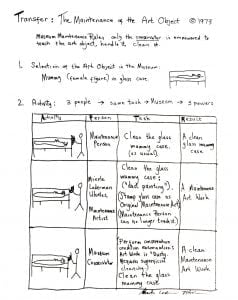MATTERS OF CARE: MARIA PUIG DE LA BELLACASA (2017)
Considering and comparing my learning in this book with the work of artist Mierle Laderman Ukeles, whom I researched in UVC 2 and revised her work, Manifesto, 1969. She wrote Manifesto! Maintenance Art and a proposal for an exhibition titled Care in October 1969. I found Bellacasa taking these thoughts forward which I could link to my own making.

Notes on my learning:
Bellacasa refers to Harraway (2017:71-78) when she discusses the idea of “thinking with’ – indicating a relationship with and between things. She looks at appropriation and objectifying which implies according to her that care required us to acknowledge vulnerability and understand involvement and not necessarily being in charge.
In chapter three she looks at the haptic – touching, being in touch with as how it deepens awareness of the embodied character of our perception and thinking. She talked about touch (2017:98-102) that points to a sense of concern, which could also become ambivalent (in cases of shielding from touch to survive hurt)
Bellacasa (2017) argues about care and Feminist ethics: “Feminist ethics of care argue that to value care is to recognize the inevitable interdependency essential to the existence of reliant and vulnerable beings. Interdependency is not a contract, nor a moral ideal—it is a condition. Care is therefore concomitant to the continuation of life for many living beings in more than human entanglements—not forced upon them by moral order, and not necessarily a rewarding obligation.” Bellacasa described later in her book how she was involved in learning about permaculture: “I read permaculture as a timely intervention at the heart of the contemporary awareness that we live in a nature cultural world.” (2017:127) and then later (2017:129): “Permaculture invites us to think with the “edges”—of lands and systems, where the encounters are both challenging and diversifying beyond the expected and manageable. So there we go. Embedded in the interdependency of all forms of life—humans and their technologies, animals, plants, microorganisms, elemental resources such as air and water, as well as the soil we feed on—permaculture ethics is an attempt to decenter human ethical subjectivity by not considering humans as masters or even as protectors of but as participants in the web of Earth’s living beings.”
It is here that I feel I connected the author and finished reading the book online in one day (26 September 2022)
The Spell of the Sensuous Perception by David Abram
I started reading this book with a student group and our first discussion on Chapter One is due in November 2022. I could not attend the discussion and will share some notes and continue to add as I read the book as well as discuss with the rest of the group.
Reading Chapter Two